COUNTER PROGRAMMING
Egyptian-American filmmaker Jehane Noujaim's Control Room offers a fascinating glimpse inside the inner workings of Arab broadcaster Al-Jazeera during the recent war in Iraq. Danny Schechter speaks with the filmmaker.
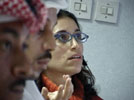 | 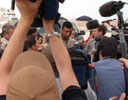 | 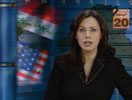 |
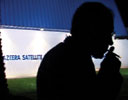 | 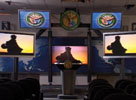 |
| Stills from Jehane Noujaim's Control Room. | |
The 1991 war in Iraq propelled an American satellite channel, known colloquially as the Chicken News Network and by its initials, CNN, into a global news power. In the second Iraq war, another broadcaster, Al-Jazeera, became famous — or infamous, depending on your point of view.
Most Americans know Al-Jazeera for its broadcasting of videos taken of Osama bin Laden. During the war, its reporting attracted the animus of American officials who alternately sought airtime to push their views and then vented if the station ran images and information challenging their message. Most U.S. news outlets seemed to mix jingoism and journalism by cheerleading for “the War for Iraqi freedom.” Al-Jazeera offered a counternarrative focusing on the pain and suffering of its victims.
Now a collaborative effort among Egyptian-American filmmaker Jehane Noujaim (Startup.com), Al-Jazeera producers, and a U.S. scholar teaching in Cairo has resulted in a documentary, Control Room, premiering at the Sundance Film Festival. While the American media embedded themselves with the American military, Noujaim embedded herself with Al-Jazeera, and the story she and her collaborators tell is fascinating.
Control Room is a gripping inside look at how Al-Jazeera thinks and works. It gives you a feel for these journalists’ humanity, politics and sense of irony. It also shows how seriously they take their ethical responsibility for balance, even as many of the U.S. outlets that preach that value rarely practice it.
Filmmaker: How did you decide to make Control Room?
Jehane Noujaim: I have traveled back and forth between the U.S. and the Middle East my whole life, and I’ve always been interested in the fact that there are completely different stories [in the two regions concerning] the same world events. How is it possible to have a peaceful world, people talking to each other and understanding each other, when there are completely different views being told to the people?
Filmmaker: What exactly is Al-Jazeera?
Noujaim: Al-Jazeera is the first free Arab news network. It claims most of the viewership of the Arab world.
Filmmaker: When you say “free,” what you really mean is that it’s a commercial station. It’s not a state-run broadcaster like many of the others in the Arab world.
Noujaim: Right, it’s not a state-controlled television channel. It’s a commercial television channel. And it was started when the BBC Arab World Service was shut down. A bunch of those journalists moved to Qatar, and that’s when Al-Jazeera started.
Filmmaker: So it was set up as this outlet by former BBC trainees and BBC journalists to try to create an Arabic-language service for the Arab world. Am I right?
Noujaim: You are right! You should answer these questions.
Filmmaker: You can’t assume too much knowledge.
Noujaim: That’s true. Many people watched a cut of the film and said, “Oh, I thought that Al-Jazeera had something to do with the Iraqi television and that it was run by members of the Iraqi government.” I was flabbergasted. Al-Jazeera was heavily criticized by the Iraqi government and was kicked out of Iraq on a couple of occasions because the Iraqi government didn’t feel like their press was favorable.
Filmmaker: When people say that kind of thing — about Al-Jazeera, for example — does it also say something about American ignorance of the Middle East?
|
|
Filmmaker: Did you have access within Al-Jazeera before you started the film? How did you begin the project?
Noujaim: I went to Qatar because all the news outlets in the U.S., Europe, Australia and Asia had offices in this small country. I thought that it was going to be a place where you could see the creation of news, and it was actually a news “factory” during the war. I decided to go a few weeks before the war started, and at that time I had no access to Al-Jazeera. I went there and basically knocked on doors. Abdullah Schleiffer is our executive producer, and he covers Arab news stations, and so he had a long relationship with the folks at Al-Jazeera. Through him, I spoke to the head of Al-Jazeera. And at central command, I was able to follow one of the NBC guys, a guy named David Schuster, mainly because, again, Abdullah had been news bureau chief of Cairo for NBC for 10 years. And [Schleiffer] also made the introduction to Lieutenant Rushing, who was quite an enlightened press officer in terms of the fact that he was very open to trying to understand the other point of view.
Filmmaker: How did you choose the specific characters in your film? What interested you in them?
Noujaim: I wanted to find people who were really trying to understand the other side, who were complex characters. I didn’t want to take the cheap shot at Fox News — you know, it’s very easy to do that. I thought that picking intelligent characters would be the best [approach]. You have to follow somebody you have a belief in. You have to feel that there may be something they might discover because their mind is open enough to discover it. I don’t think it’s interesting to follow characters who you know are never going to change.
Filmmaker: As represented in your film, the Al-Jazeera journalists are almost classical Western journalists in the Middle East. They are representing — to me anyway — the values that American media seems to have abandoned because of showbiz techniques and the rest.
Noujaim: Yeah, I think that there’s still this feeling among journalists in the West, like the NBC reporter, for example, that they want to be reporting international politics, looking deeper into stories and making more in-depth stories rather than just taking the sound bites. But I think a lot of them feel the pressure to appeal to a public that wants everything simplified. And I myself haven’t figured that out: what comes first, the chicken or the egg? Is it the public that really wants to simplify press, or is it the press that is providing and conditioning people to only want this simplified, sound-bite-y kind of news? As one of the journalists says, television is for entertainment, and now news has turned into entertainment. If you want to actually understand anything, then you can’t watch television news.
Filmmaker: So let’s talk about some of your specific characters. Here you have an Iraqi. He is clearly anti-Saddam, he is a news producer or major producer at Al-Jazeera, and in your film he confesses in one moment to thinking of leaving the Middle East and coming to work for Fox News. Bizarre, unexpected.
Noujaim: He is a surprise a minute, which is why I loved following him. He represents to me the complexity of many people in the Middle East and their relationship with the United States. I think everybody in the Middle East would love to have the freedoms and the liberties that people have in the United States, but at the same time, there is a resentment, a feeling that there is hypocrisy in American foreign policy.
Filmmaker: And then you have this American military guy who in your film justifies American policy but then, after talking with some Al-Jazeera journalists, pauses for a minute and says, “Look, when I get out of the military, I want to work on the Palestinian issue.” That shocked me!
|
|
Filmmaker: What do you hope the audience will come away with from watching your movie?
Noujaim: Well, I came away with the fact that, like your book [Embedded: How the Media Failed to Cover the War] says, the more I watch, the less I know! I came away with the fact that I felt like I had to look a lot deeper into everything that I’m watching and examine all the stereotypes that I do have. So I would hope people would also come away from this film taking nothing for granted that they see on television.
Filmmaker: How does this film compare with Startup.com?
Noujaim: It’s very different. For me, it was about going to a place for 30 days (because that’s as long as I got the visa for) and getting an impression of the war from a number of different viewpoints. In Startup.com, I followed my roommate for a year and a half, and it was much more of a story about two people going through an emotional journey together. This film is much more a look at events from a number of different perspectives and how those perspectives, because they have such an influential role in shaping opinion, affect the world.
Did you hear what Donald Rumsfeld said today in his press conference? Once more he said — he says it two times in our film — that he has no problem with the American press and the Western press but that the Arab press continues to lie, continues to give false messages, continues to lie to its people. And in the film, you saw that he accuses Al-Jazeera of placing women and children in front of bombed-out sites.
Filmmaker: True?
Noujaim: Not that I saw.
VOD CALENDAR


 See the VOD Calendar →
See the VOD Calendar →


